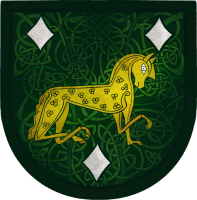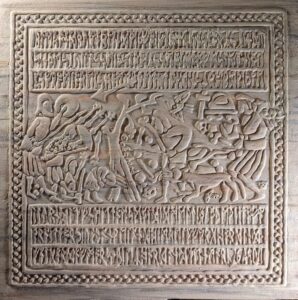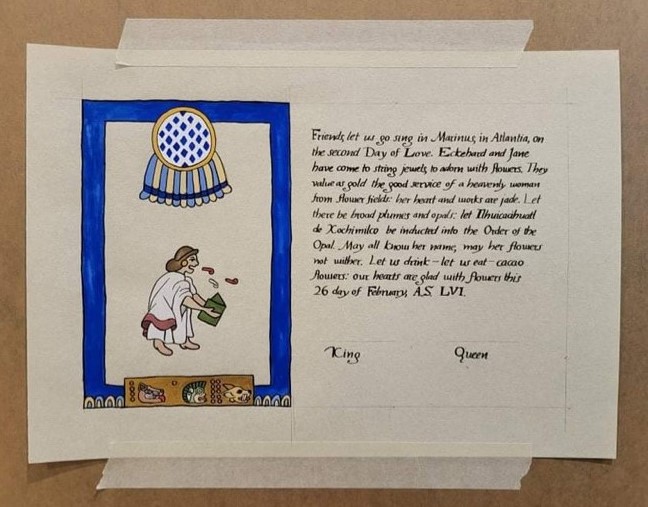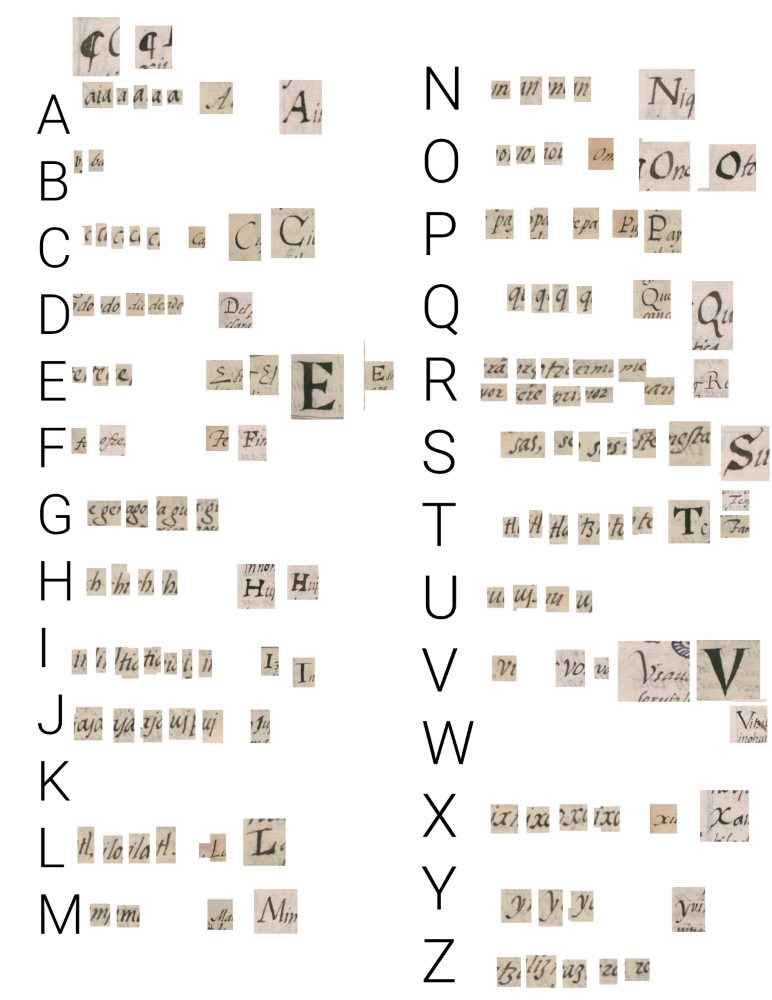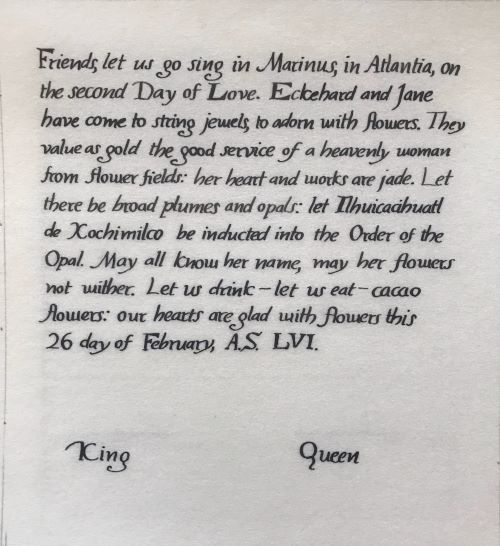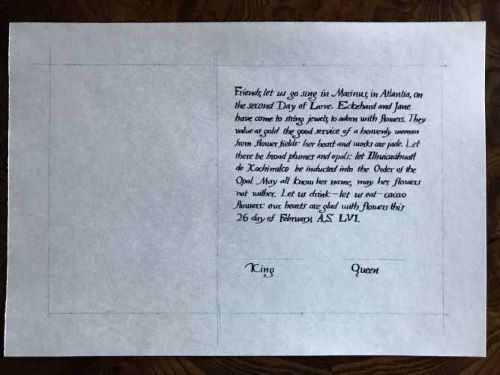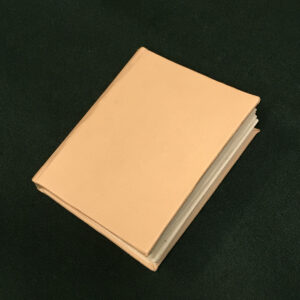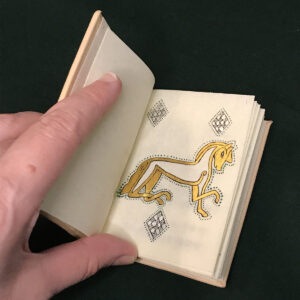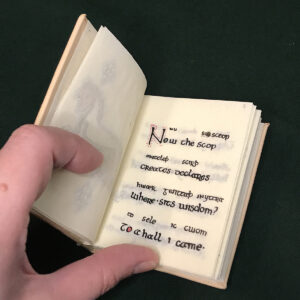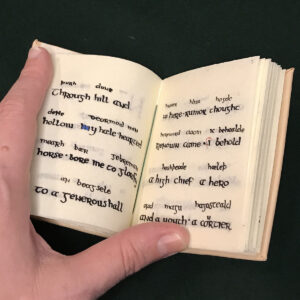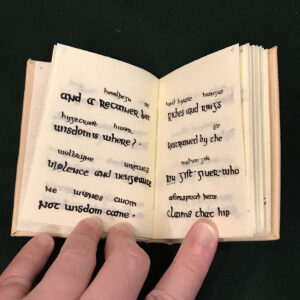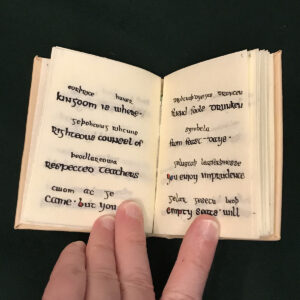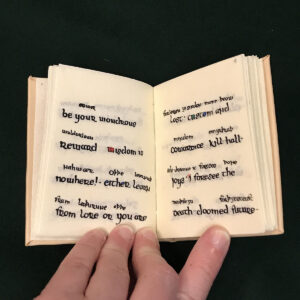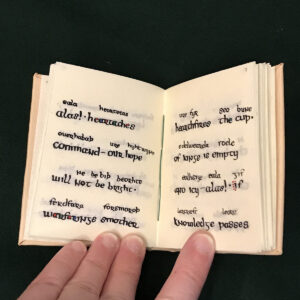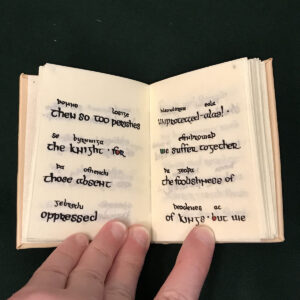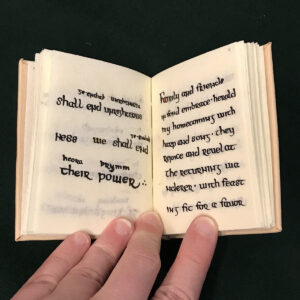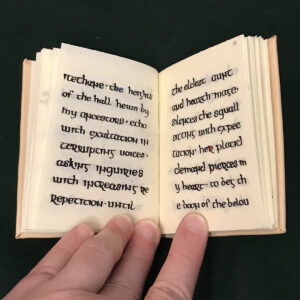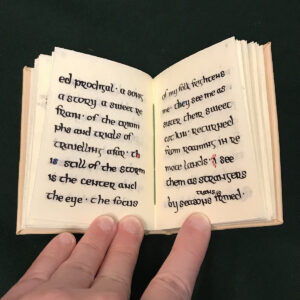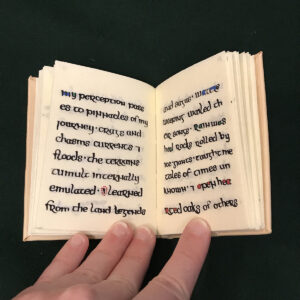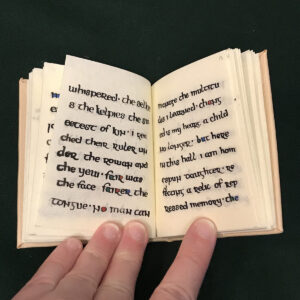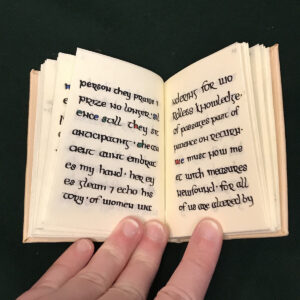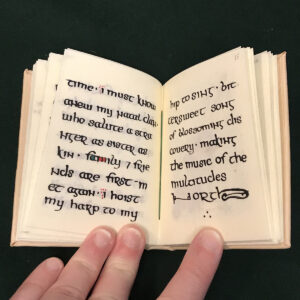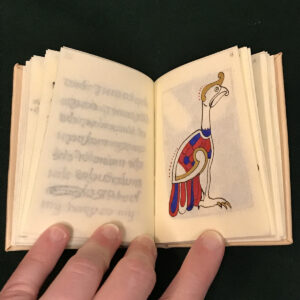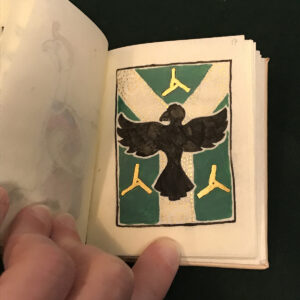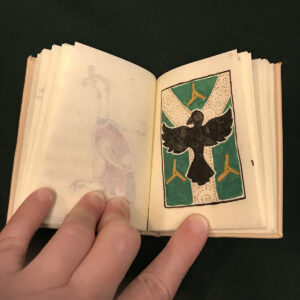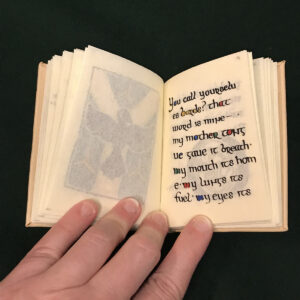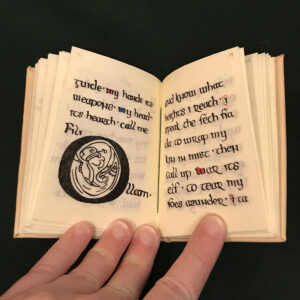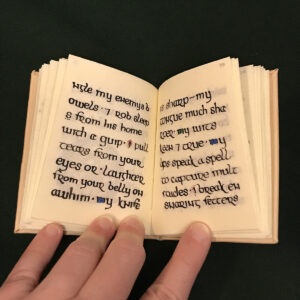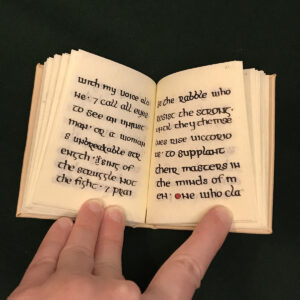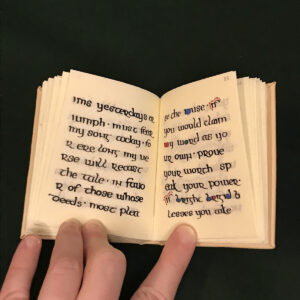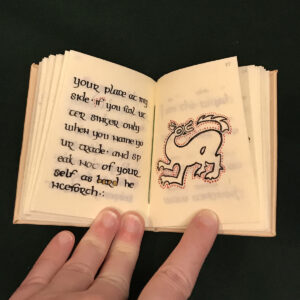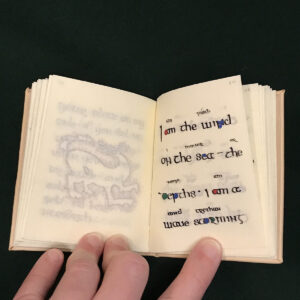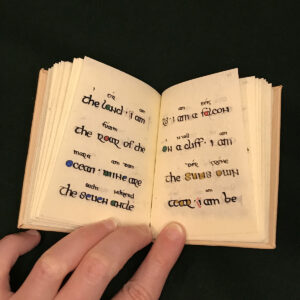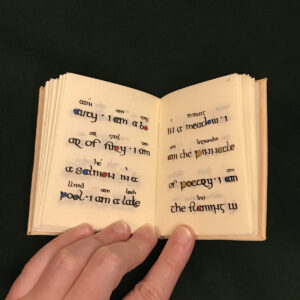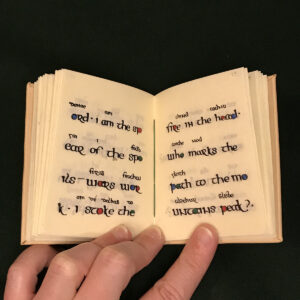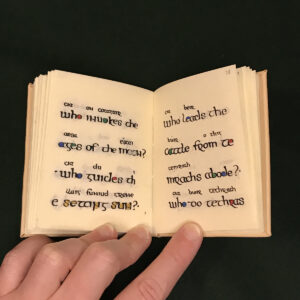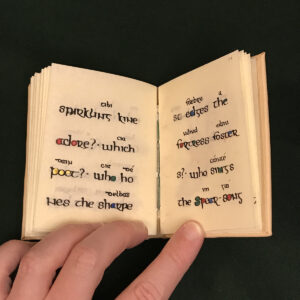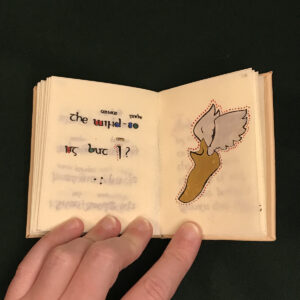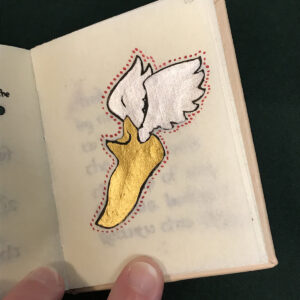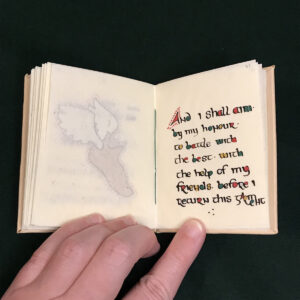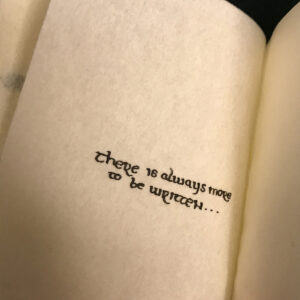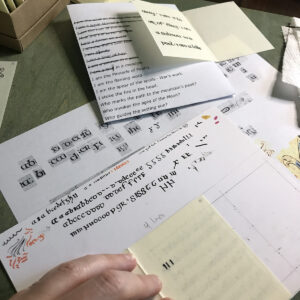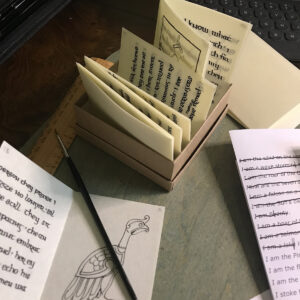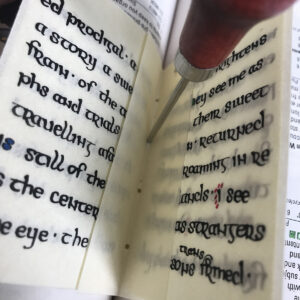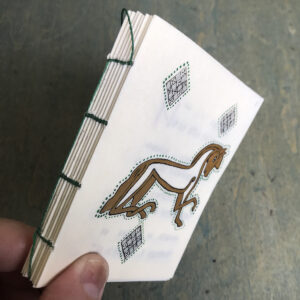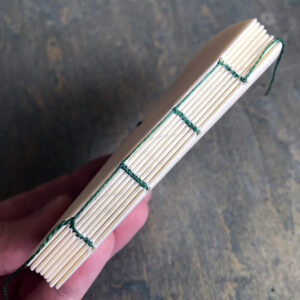This poem is a treasure of Atlantia, begun by Duke Cariadoc of the Bow and expanded for Atlantia’s Thirtieth Year Anniversary, so I was honored when I was asked to update it for the Fourtieth Year Anniversary.
However, updating it was a bit of a challenge, as there was no information in the Poeta binder and several years were missing, so first I had to scour the internet for different versions. Then, I reached out to several helpful folks, including past Poetas. Several past Poetas were available to write the poems for reigns during their tenure, and I was kindly offered some verses by others. In addition, as I looked more closely at the poem, I realized that a few of Cariadoc’s original verses were repeated in the longer Thirtieth Anniversary verses, making it a little confusing to follow.
Therefore, I decided to add a new framing device that explained the poem’s origins and transitioned from Cariadoc’s verses to the fuller poem. Reflecting on the fourtieth anniversary, I also decided to honor the Crowns of the Principality before we were a kingdom by adding verses for them; this also created a smoother transition from Cariadoc’s original verses while also created distance between the verses that are repeated in both the original and the longer poem.
Because I also found it difficult to navigate the poem, I numbered the verses and reigns in the final text, which will be given to the next Poeta, and which I reproduced here as best as possible. Finally, because credit matters, I revised the credits to include both the verses and the reigns that each person wrote for, so it is easy to identify authorship in the future.
Now, without further ado, the Atlantian History Poem, updated for the Fourtieth Anniversary!
The Poem
In ancient times and distant lands
A challenge came to pen a rhyme
Cariadoc stretched out his hand
and captured Atlantia’s crowns sublime
The first twelve crowns he placed in fame
for posterity and pride of peers.
With glowing stanzas for each name,
the duke’s own words follow here:
Carissa, Queen of all the East,
With Michael gave our realm its throne–
And then, before their reign had ceased,
They won it back to be their own.
Now Anya is a queen most rare.
Bertrand full half his kingdom knows.
He can describe each lady fair–
But not the color of her clothes.
In floods of mead the benches drown (verse 5)
And great the glee of thirsty men
When Gyrth, great-gutted, takes the crown
And Melisande is queen again.
Jahn and Tuiren have done more
Than ever lords of coast and sea-salt.
For they have ruled from shore to shore
Atlantia to Drachenwald.
Now Bedford’s blade in fury falls
And for his foes ’tis death to find it.
Duke Michael is a moving wall
Carissa wholly hid behind it.
It was Sir Olaf, when he fought,
For Aslinn with his heart and hand,
Who by his skill and fortune brought
Atlantia’s crown to southern land.
Now Richard Corwin for his Anne
Atlantia’s crown has bravely won
He’s just a good and faithful man
Who’s doing as his knight has done.
Sir Knarlic, with a dragon blade (verse 10)
Atlantia’s knights has beaten down,
But conquered by Atlantian maid
He to Alexis brings the crown.
For Gyrth it is a gladsome day
To know he has such sturdy men;
Count Richard in the bloody fray
For Anne has won the crown again.
Sir Olaf, through the flood of foes,
His Aslinn spies above the fray,
And bold Tsuneo, dying, knows
The crown will not be his today.
Tsuneo keeps his Nyan Nyan near.
He has such skills as suit a knight,
Can fight with sword and bow and spear.
His concubine can read and write.
Some kings and queens for dress are known,
Others for how they plot and scheme
Since Klaus for Cyffaith won the crown
Our sovereigns are a Melee team.
Now let the words straight from the Bow (verse 15)
Blend with Atlantian poets’ tongues.
To fly each word true as the crow,
Start the tale when we were young:
The first to rule our sea-lapped shores
Were Alaric and Yseult the good.
A principality in store,
They led us from the mirky wood.
Second upon Atlantia’s throne
A suitable and sterling pair:
The gracious Ysabeau Cameron
And son of Laverty, Laeghaire!
Quickly came the third successors,
Princess Carissa of Burgundy
Alongside Prince Michael of Bedford
To rule the principality.
In society’s thirteenth year
Atlantia firmly held her fortune
Gracious Khirsten and Bryetor
Rose to reign as their due portion.
Words we can no longer mince: (verse 20)
Herald the fifth with flute and drum!
Kindly reigned the Princess and Prince
Deadra and Tojenareum!
Sixth in line came Thorwald’s son
Ragnarr bravely joins the fray!
To make a princess the gilded one
called Gwenllian de la Forêt.
Now see our principality’s
Penultimate princely guides:
Astarte full of regality
And Bertrand boldly by her side
Bryetor and Kathryn grin;
Behold Atlantia, safe to grow!
Another era now begins
As a kingdom they bestow.
Here now begins the line of kings,
Through strength of arm the throne did find.
Learn of the fame that ruling brings
When art and service prowess bind.
Carissa, Queen of all the East (verse 25/reign 1)
With Michael gave our realm its throne —
And then, before their reign had ceased
They won it back to be their own.
In fire and flame came Count Bertrand
For Anya from Calais’ far shore
Reigned second in the sea-bound land
When they assumed the regal chore.
Sir Gyrth, the mighty Saxon thane
He swept the field at Sacred Stone
The third Atlantian King became
With Melisande he shared his throne.
Jahn’s chivalry all men have seen
And Queen Tuiren’s skillful hands
The fourth Atlantian King and Queen
Have honors earned in many lands.
Across the battlefield did ring
A parti-colored lion’s roar
So Michael came to be fifth King,
and to Carissa roses bore.
Sir Olaf at sixth crown he fought (verse 30/reign 6)
For Aslinn with his heart and hand
And by his skill and fortune brought
Atlantia’s crown to Southern land.
Richard Corwin was seventh King
Fair Anne his lady graced his side.
Oldcastle’s second king did bring
The crown northwards awhile to bide.
King Knarlic came from Normandy.
Alexis Queen ruled at his hand.
“No more Eastrealm treaty,” said he.
They were the eighth to rule the land.
As summer’s king did Richard claim
His place lo lead the knights to war.
The ninth king of the realm became,
Queen Anne beside him as before.
The lords for Aislinn’s love would sin.
Olaf has charm and ready quip.
This pair the realm’s tenth crown did win
With flashing sword and shaking hip.
Tsuneo ruled as in Japan (verse 35/reign 11)
With concubine of quickest wit
Nyan-Nyan hid not behind her fan
Eleventh reign with laughter lit.
Who was the twelfth on sea-hone throne?
Twas Klaus and Cyffaith, brave and best.
Fair and bright their swords both shone.
Two fighters reign — our kingdom’s blest.
Ten reigns and two the bards recite
‘Ere Judith reigned at Olaf’s side.
For service, craft, and battle-might
With open hands they did provide.
Then came Badouin to take our crown
And with his Caterina sit
The fourteenth on the sea-horse throne,
Their battles won with sword and wit.
As fighter, archer and artisan,
Sir Dafydd’s prowess all have seen,
Fifteenth King to rule the land,
Elizabeth his gracious Queen.
Barry and the fair Simone (verse 40/reign 16)
Were sixteenth King and Queen to reign
He won the right to claim the throne
Before he earned his belt and chain.
Once again does Michael stand
Victorious upon the green,
With Seonaid rules our happy land.
Their reign was number seventeen.
Now Barry comes again to win
Atlantia’s crown for Queen Simone
With drums and bagpipes they begin
Eighteenth reign upon the throne.
Duke Michael once again returns
Atlantian army leads to war.
A ducal crown for Seonaid earns,
The nineteenth reign in kingdom lore.
Duke Olaf swore, “Just one more time!”
For Aislinn he would win again,
The twentieth of royal line
As Sultan and Sultana reign.
For Luned’s smile and honor bright (verse 45/reign 21)
Sir Anton fought with might and will,
The twenty-first to reign by right,
First monarchs from Windmasters’ Hill.
Tall and strong stands Ingolf’s son
Galmr’s sword did bloodless slay
For Katharina fought and won
The twenty-second Crown that day.
King twenty-three, Michael returns,
Take up the Crown, re-seize the day!
To reign with Seonaid thrice he yearns,
The once and future king he’ll play.
A fresh light from Wulfshaven pours,
Steffan and Twila, twenty and four,
To new heights Atlantia soars!
Love and laughter forever more.
Cuán claims reign twenty and five,
Freshly minted, the three-dog knight,
Aria, the nimble-fingered,
Inspiring his winning fight.
Hidden Mountain’s favorite son, (verse 50/reign 26)
Black Kane strides forth with Muirgen fair,
Tragic lives too quickly undone,
Atlantia’s twenty-sixth pair.
Windmasters’ Hill calls forth its King
To serve twenty-seventh, yet twice,
Snowden’s best daughter Anton brings,
Winning calm counsel and advice.
Mighty Crowns the kingdom protects,
As armor shields the knight in war,
Thorbrandr from his forge defects,
With Eórann, twenty-eighth to soar!
Hail poured down while Michael was crowned,
But king twenty-nine was no fool,
Ice may cover the April ground,
Still, Michael and Seonaid must rule!
Cuán another queen creates,
Elevating Brigit sublime,
Both bending heads low, brows await,
The Crowns rest a thirtieth time.
God bless Katharina, our Queen, (verse 55/reign 31)
Galmr gifts her to us again!
Mercy flows forth from soul pristine,
Thirty-first, yet first, in hearts of men.
When Logan first did Rule our land
With Arielle, his chosen Queen.
Our Thirty-Second Monarch’s reign
Was all awash with Grace and Gleam.
Our mighty Cuán’s Dogs of war
Did claim the right for Bera true.
Atlantia’s Monarchs, Thirty-third
And all false paths they did eschew
So thirty-four was King Logan,
The black wolf besting sword and mace,
With Arielle always golden,
Beside him with her strength and grace.
The Stalwart Lion, Michael led
The graceful Seonaid to the throne
Pair thirty-five they were declared,
Because one cannot rule alone.
Not once, not twice, but thrice we’d seen (verse 60/reign 36)
Anton and Luned take the thrones
now full three dozen reigns had been
since fair Atlantia had its own.
While Stephan, thirty-seventh king
Was called away to foreign lands
Queen Niobe sought to bring
Peace to hearts and hope to hands
When Amalric did join the fray
The Black Hart raged for Caia’s fate
The list was strong; he took the day
Their reign was number thirty-eight.
Kyneburh and Ragnarr came
And sought to lead Atlantian hearts
The thirty-ninth to lead our game
Of service, fighting and the arts.
Then did Anton take the field
His strong left arm would not be staid
He did not fall and would not yield
Our fortieth Queen was Emer made
Havordh and Mary Grace did thirst (verse 65/reign 41)
To rule Atlantia’s mighty shores.
They served our kingdom forty-first
And at the thirtieth Pennsic war.
Galmr and Aryanna held
The burden of their sovereignty
From Lochmere’s lands in which they dwelled
Our forty-second monarchy.
Forty and three our queens and kings
Have ruled the lands in which we dwell
And now the praises all do sing
Of Logan and fair Isabel.
From Middle Kingdom came she hence
Pádraigín traveled to our shores
Stole Cuán’s heart and holds it since
Two score and four the reign they bore.
Fair Isabel, she is the sun
To balance Logan, dark wolf Knight.
The forty-fifth Atlantian Jewel,
Was a congenial sight quite right
The forty-sixth so then was seen, (verse 70/reign 46)
Ragnarr to take again his sword,
And serve with Kyneburh as queen,
True to the lands, in heart and word.
With sword and song did rise Cuán,
As king and too forty-seventh
In heart, Pádraigín was his twin,
Did bring the land to a zenith.
János leads with sword and shield
Rachel’s fiercesome quarrels fly
Allies cheer and foeman yield
When Monarchs forty-eighth came nigh.
Robert de Rath took up his sword
And for Denise he fought in course
The forty-ninth lady and lord
To lead Atlantia’s fighting force.
Societatis’ fortieth year
As our fiftieth crown by right.
János and Rachel helped to steer
Our kingdom on to futures bright.
Twenty-five years we had attained (verse 75/reign 51)
When Michael led us once again
With Seonaid, fifty-first did reign.
May we shine now as we did then.
With sword and wit as equal tools
Did Ragnarr on the list-field stride
The fifty-second king to rule
With Queen Anneke at his side.
Then Valharic, imperator
With Arielle, imperatrix
The fifty-third to lead in war
Sent all our foemen to the Styx.
As time does pass, and has before
So showed Logan as true and fit
To bear the crown as fifty-four
With Rowan’s grace and strong spirit.
The fifty-fifth was then Sinclair,
With Kari, he ruled with wisdom,
Their judgments were even and fair,
Keeping the peace in the kingdom.
For his Gerhild, Jason did slay (verse 80/reign 56)
Kin and kindred on the Crown’s field
Fifty-sixth King and Queen were They
Viking strength makes all foeman yield.
In Jason’s Crown new love alight
Our Fifty-seventh Crown to bear
Esa made Queen by Logan’s might
Her bright spirit beyond compare.
Betrothed when they took the field
He’d wed his princess soon after
Vlad and Kalisa, fifty-eighth
Monarchs of love and of laughter.
For reign fifty-nine again did Kynslay
Place the Crown on Gerhild’s fair head,
She did join in rapier play.
On all fields our enemies bled.
Bryan wins the sixtieth crown,
Radiant Brianna at his side.
Journeying the land, up and down,
Atlantia’s glory they spread worldwide.
Michael strides forward on the field, (verse 85/reign 61)
Seonaid cheering her lord ever on.
The sixty-first tourney’s fate was sealed
The thirtieth year was as year one.
Reign sixty and two brings Cuán,
A strong king both wise and gifted.
By his side rules fair Pádraigín,
By our sons and daughters beloved.
The Wolf, no fear will he allow;
He defeats Atlantia’s best.
Reign sixty-three is Bryan’s now–
For Brianna in steadfastness.
Valiant Vlad now fights once again
In chivalry, skill and fairness;
Stands tall for the sixty-fourth reign.
With Kalisa he brings blitheness.
Though pious and virtuous he may be
His strength came to be known to all
Sir Amos with his faith almighty
Ysabella matched him with siren’s call.
Ragnarr a master of hammer and sword (verse 90/reign 66)
Came before the Atlantian throne
Fair Lynette inspiring her noble lord
The sixty-sixth rule rich with their tone
King William has a mighty sword
Queen Kara is a burning light
The sixty-seventh crown They wore
And were Atlantia’s delight.
Michael of Bedford is well known
With Seonaid his sweet-loving Queen
As sixty-eighth to sit the throne
Their will we do not contravene.
Logan, a black wolf, sly and strong,
Esa, inspiration, for noble souls
Together they right all that is wrong
Fulfilling strong the sixty-ninths’ roles
With German strength comes Sir Christoph
On his arm the glorious Lady Adelhait
The seventy reign with drama starts off
Enough to inspire many an acolyte
To celebrate the fiftieth of the world (verse 95/reign 71)
Dietrich with Thora held most high
Atlantia’s seventy-first with banners unfurled
The glory of the kingdom none will decry.
For seventy-two the poet abstains
For pen will not falsely commend;
Dragons were slayed after this reign,
And no more words shall we spend.
Now Signy Heri by Cuán is Queen
Warriors fierce sitting to serve.
With kind words for the young and the green,
Justice and Truth come seventy-third.
Amos and Kara, as seventy-fourth,
Specious stifled the peahen’s cry
Hawking honors of great worth
As wint’ry months flew darkly by.
Yaşa was cried in Dietrich’s reign,
Alongside Una as Sultana.
His commanding bass boomed on campaign;
Th’ harmonious Una, vox humana.
Atlantia sang refrain once more, (verse 100/reign 76)
As Ragnarr Fifth joined Lynette II.
The seventy-sixth to rule our shore
May future rulers ring as true!
Jolly Christoph, beer in hand,
With sweet Adelhait they lead the way
As seventy-seventh holding the land
Mid laughter bright, they bade us play.
Cuán and Signy were called again
To guide our kingdom for half a year.
Seventy-eight, they did not wane
When the plague spread o’er the sphere.
Accompanied by hounds of white
Anton and Luned strong did reign
Seventy-ninth, through all plague’s blight
By light of their devotion’s flame.
And at the end of that dire hour,
Came the glorious eightieth reign!
As bright and blooming as sunflowers
Were Eckehard Thurn and sweetest Jane.
Of Kings and Queens our story told (verse 105)
Their might to rule these happy lands
Argent-azure the flag flies bold
The past lives on in future’s hands.
Credits
Original twelve verses by Cariadoc of the Bow
Original introduction (now verse 24) and final verse by Johanna von den Glocken
Principalities and new introduction (verses 1-2 and 15) by Ealawynn Mæru (alias Ela) upon the 40th Year Anniversary of Atlantia
Starred (*) poets have served as Poeta Atlantiae.
Authorship by verse:
3-14, 25, 30: Cariadoc of the Bow
24, 26-29, 31-46, 105: Johanna von den Glocken
47-55: Bran Trefonnen *
60-68, 72-77: Dunstan LeHeryngmongere *
58, 70-71, 78-79: Maaline Reynard *
56-57, 59, 69: James of Middle Aston *
80-83: Ceridwen ferch Owain *
84-85, 89-90, 93-95: Etienne le Mons d’Anjou *
86-88: Katarzyna Witkowska *
91-92: Deirdre O’Bardon *
99-100: Ishmael Stedfast Reed *
101: Evelyn Merrymet
103: Talia de Morales *
1-2, 15-23, 96-98, 102, 104: Ealawynn Mæru, alias Ela *
Authorship by reign:
1 and 6 repeat Duke Cariadoc’s original poem
2-5, 7-22: Johanna von den Glocken
23-31: Bran Trefonnen *
36-44, 48-53: Dunstan LeHeryngmongere *
34, 46, 47, 54, 55: Maaline Reynard *
32, 33, 35, 45: James of Middle Aston *
56-59: Ceridwen ferch Owain *
60-61, 65, 66, 69-71: Etienne le Mons d’Anjou *
62-64: Katarzyna Witkowska *
67-68: Deirdre O’Bardon *
75-76: Ishmael Stedfast Reed *
77: Evelyn Merrymet
79: Talia de Morales *
72-74, 78, 80: Ealawynn Mæru, alias Ela *
